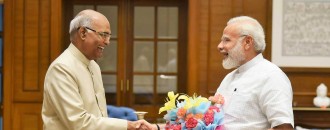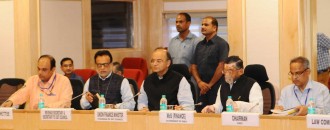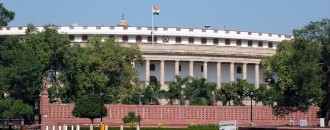
Ram Nath Kovind will be the new President of India, to take oath on July 25
The Dollar Business Bureau Former Governor of Bihar and National Democratic Alliance's (NDA's) Presidential nominee Ram Nath Kovind will become the 14th President of India. He will succeed the incumbent President Pranab Mukherjee, whose tenure is completing on July 25. Kovind obtained 65.65% of votes from the Electoral College, while his opponent, joint Opposition nominee Meira Kumar got just 34.35%. “Kovind secured 2930 votes with a value of 7,02,044. Meira Kumar got 1,844 votes with the value of 3,67,314, and 77 votes were invalid,” informed Anoop Mishra, the returning officer for Presidential Election 2017. Prime Minister Narendra Modi congratulated Kovind for his win. “Gladdened by the extensive support for Ram Nath Kovind Ji among MPs and across various states,” Modi said. Kovind got votes of 522 ...

Indias meat export rises to 13.53 lakh tonnes in 2016-17: Sitharaman
The Dollar Business Bureau Meat exports from India rose to 13.53 lakh tonnes in the financial year 2016-17 from 13.36 lakh tonnes a year ago, Commerce and Industry Minister Nirmala Sitharaman informed the Parliament on Wednesday. However, in value terms, exports dropped to Rs.27,184 crore in 2016-17, compared to Rs.27,528 crore in 2015-16. “The Commerce Ministry has received no complaint with regards to the prevention of production of leather and meat, Sitharaman said in a written response to the Rajya Sabha. However, the export of buffalo meat was declined, according to the data, she said. During April-May period of 2016-17, buffalo meat export was $554 million whereas it stood at $530 million during the same period this ...

Goods and Services Tax Place of Supply
By Ranjeet Mahtani and Sweta Rajan After the approval of the Lok Sabha on March 29, 2017, four supporting GST bills, viz. the Integrated GST (IGST) Bill, Central GST Bill, Union Territory GST Bill and the Compensation Bill were sent to the Rajya Sabha for their comments. The Rajya Sabha cleared the bills on April 6, 2017 without any amendments. With this, the July 1, 2017 target for the introduction of GST seems realistic. Trade and industry are therefore in the phase of deliberating the law and examining potential issues. Under the GST regime, every transaction will have to be subjected to a 4-point analysis: when is the GST applicable? on whom is it applicable? how much is applicable (rate of tax), and what are the ...

Finance Bill gets presidential assent, takes effect from today
PTI President Pranab Mukherjee has given his assent to the Finance Bill 2017 to give effect to provisions like bar on cash transactions above Rs 2 lakh and compulsory quoting of Aadhaar for filing tax returns. "The President was kind enough to give his assent to the Finance Bill before he left for official visit to Assam yesterday," Revenue Secretary Hasmukh Adhia told PTI here. With this, the provisions of the Finance Bill come into effect from today, he said. This is the first-time ever the annual Budget together with taxation proposals have come into effect from the first day of the financial year. Scrapping a colonial-era tradition of presenting the Budget at the end of February, ...

IGST, CGST and Compensation Bill receive Lok Sabha nod
By Ranjeet Mahtani and Sweta Rajan A seven-hour long debate in the Lok Sabha, resulted in the passage of the Integrated GST, Central GST and GST Compensation Bills this week. Having been introduced as ‘money bills’ the Rajya Sabha did not have the power to amend or reject bills. Now, the Bills require presidential assent to become law. In preparation for the transition to GST, the Central Government has introduced another bill in the Lok Sabha to amend the Customs Act, 1962, the Customs Tariff Act, 1975, the Central Excise Act, 1944, the Central Excise Tariff Act, 1985, the Finance Act, 2001, and the Finance Act, 2005, and to repeal certain existing enactments. These amendments are essential to modify the tax levying ...

Goods and Services Tax: Progress made, concerns and the way forward
By Ranjeet Mahtani and Sweta Rajan Draft GST laws The Union Cabinet chaired by the Prime Minister has approved the Integrated GST, Central GST, Union Territory GST and GST Compensation bills on March 20, 2017. These four bills will now have to be passed by the Parliament. It is expected that the bills will be introduced in the Parliament early next week as a ‘money bill’ (note that the Rajya Sabha does not have the power to amend or reject money bills and is required to return it to the Lok Sabha within 14 days). Should the July 1, 2017 target for the introduction of GST in India be met, the Parliament will have to pass these bills before the end of ...

Govt targets to rollout GST by April next year
The Dollar Business Bureau The government has set a target of April 2017 to roll-out the goods and services tax (GST), as it is banking on regional parties to support it and pass the legislation in the monsoon session of Parliament next month, said Jayant Sinha, Minister of State for Finance. “If the government can pass the GST bill in the monsoon session of Parliament (starting next month), then it can be implemented by April 1, 2017," Sinha said. “The centre has enough support of the regional parties to clear the bill in Rajya Sabha, even without the support of the major opposition party, Congress,” he said. Earlier, the government was planning to introduce GST on April 1, ...

GST legislation likely to pass in next session
The Dollar Business Bureau The Government is trying hard to create a consensus in passing the Goods and Services Tax (GST) bill and Rajya Sabha would surely pass the bill in the coming Parliament session, Ajay Tyagi, Additional Secretary of Finance said on Wednesday. Ajay was speaking at the National Agriculture Market seminar organised by the PhD Chamber of Commerce and Industry. The main objective of the government behind introducing the GST is to bring uniform taxation. It also aims to create uniformity in every area of economic engagement. With this legislation, the government can create a uniform market for the goods and services in India. Other sectors, including agriculture will get benefitted as there are many distortions currently. Multiple taxations such as ...

